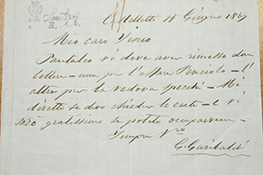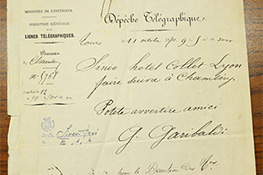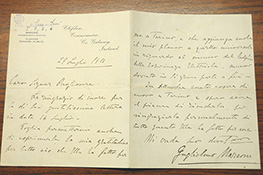Versione italiana English version Version française Versión en español
The letters and materials contained in the Fund Sineo-Arnò go to compose that galaxy of the Renaissance of which are part of the documents preserved in the Manno and Valerio funds.
Riccardo Sineo (1805-1876) participated in the Turin riots of 1821. Of liberal ideas (remember that then the "liberals" opposed the "conservatives"), he was among those who asked Charles Albert the promulgation of the Statute. Minister of the Interior (1848) and of Justice (1849), he was an opponent of Cavour and opposed the Crimean War and the cession of Nice and Savoy to France. He became Senator of the Kingdom in 1873. Carlo Arnò (1868-1953) of Sineo was the grandson, son of his daughter Paola and the mathematician Valentino Arnò. A distinguished scholar of Roman law, he was also interested in the history of the Renaissance, directing his research around the figure of his grandfather.
The Fund has several interesting documents, including some autographs by Garibaldi and one by Guglielmo Marconi (in Arnò). On Garibaldi we find notes taken by Sineo, dispatches related to his arrest in 1867 when he attempted the liberation of Rome, testimonies on the events of Sarnico (a town on Lake Iseo that was the center of a riot in Mazzini in 1862)as well as an autograph of Sineo on the annexation of Sicily to Piedmont. Other notes and news of the biennium "hot" 1848-49 concern the Turin Circolo Viale. It was a reactionary circle, but in reality the Gioberti supported him veiled because, note the Brofferio in his Storia del Piemonte, feared the republicans. However, Brofferio himself comments that the Circle had "a humble birth, a dark life, an inglorious death".
There are also three letters by Teodoro di Santarosa, author in 1858 of an unpublished restructuring project of the Sabaudian States and son of that Santorre who was a noble and generous figure of our Renaissance, died as a private fighting in Sfacteria for the freedom of the Greeks.
- Archive inventory (pdf 241 KB)



